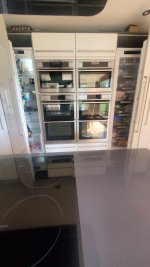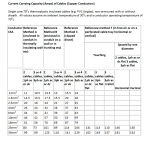Any help gratefully received here.
My kitchen is in an extension powered by a separate 50A RCBO out of the main fuse board. It has been blighted by random power trips for about 8 years.
This main RCBO supplies a slave fuse board located in the kitchen. This second fuse board has MCBs protecting the various items in the kitchen. It covers 2x dbl ovens, 13a microwave, 13a steam oven, induction hob, full height fridge and freezer, 13a boiler tap.
The tripping can happen overnight when nothing is being used (I blame power spikes and power cuts for this).
The MCBs in the slave board never trip. It is always the 50a RCBO that fails, taking down the entire kitchen.
But it also happens randomly. It might be just the microwave that does it, or just the grill on one oven, or when we have 4 ovens going. There is no pattern that I can discern.
Months go by with no problems, then a single grill trips it Four times in a row. Move to the other oven and try the grill there and it worked fine.
Does anyone know what is going on here please? Is there a cure ? Do I simply have too many items on a single cable from my main fuse board ? Is there cross talk between the appliances ?

My kitchen is in an extension powered by a separate 50A RCBO out of the main fuse board. It has been blighted by random power trips for about 8 years.
This main RCBO supplies a slave fuse board located in the kitchen. This second fuse board has MCBs protecting the various items in the kitchen. It covers 2x dbl ovens, 13a microwave, 13a steam oven, induction hob, full height fridge and freezer, 13a boiler tap.
The tripping can happen overnight when nothing is being used (I blame power spikes and power cuts for this).
The MCBs in the slave board never trip. It is always the 50a RCBO that fails, taking down the entire kitchen.
But it also happens randomly. It might be just the microwave that does it, or just the grill on one oven, or when we have 4 ovens going. There is no pattern that I can discern.
Months go by with no problems, then a single grill trips it Four times in a row. Move to the other oven and try the grill there and it worked fine.
Does anyone know what is going on here please? Is there a cure ? Do I simply have too many items on a single cable from my main fuse board ? Is there cross talk between the appliances ?


